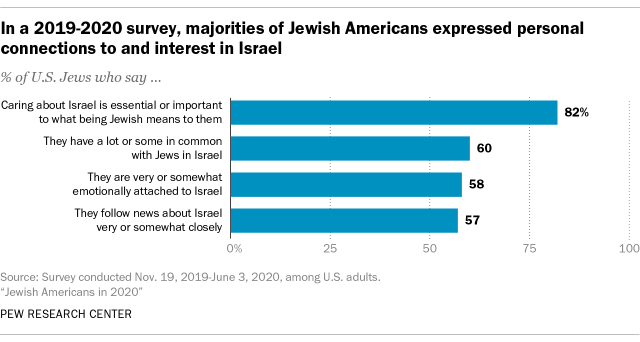
This month’s deadly attacks on Israel by Hamas have reportedly created a sense of solidarity among Jewish Americans, underscoring the personal connections that many Jewish Americans feel to Israel.
Following the recent deadly attacks on Israel by Hamas, Pew Research Center published this analysis to highlight the personal connections that many Jewish Americans feel to Israel.
All findings are based on a survey conducted from Nov. 19, 2019, to June 3, 2020, among 4,718 Jewish adults in the United States. Of those respondents, 3,836 identified as Jewish by religion and another 882 were Jews of no religion. The latter group included Americans who described themselves religiously as atheist, agnostic or “nothing in particular,” but who have a Jewish parent or were raised Jewish, and who considered themselves Jewish in any way, such as ethnically or culturally. Read the complete methodology for the survey.
Here are the questions used for the analysis, along with responses.
In a 2019-2020 Pew Research Center survey, 82% of Jewish adults in the United States said caring about Israel is an essential or important part of what being Jewish means to them. Roughly six-in-ten said they have a lot or some in common with Jews in Israel (60%), that they are very or somewhat emotionally attached to Israel (58%), and that they follow news about Israel very or somewhat closely (57%).

Many Jewish Americans have also been to Israel: 45% said they’ve been there at some point, including 26% who said they’ve visited multiple times or lived there. Those who have been to Israel are much more likely than those who haven’t to feel emotionally attached to it.
The survey was conducted from Nov. 19, 2019, to June 3, 2020, among 4,718 Jewish adults in the U.S. Of those respondents, 3,836 identified as Jewish by religion and another 882 were Jews of no religion. The latter group included Americans who described themselves religiously as atheist, agnostic or “nothing in particular,” but who have a Jewish parent or were raised Jewish, and who considered themselves Jewish in any way, such as ethnically or culturally.
Overall, Jewish Americans accounted for an estimated 2.4% of the total U.S. adult population at the time of the study. Roughly three-quarters of Jewish Americans (73%) were religiously Jewish, while about a quarter (27%) were of no religion.
Sense of connection to Israel varies among Jewish Americans
While feeling connected to Israel is common among Jewish Americans, some Jewish adults are more likely than others to feel this way.
For example, Jewish adults by religion were much more likely than those of no religion to say that caring about Israel is an essential or important part of what being Jewish means to them (87% vs. 67%). They were also far more likely to feel emotionally attached to Israel (67% vs. 33%), to follow news about Israel closely (64% vs. 38%), and to have visited or lived in Israel (54% vs. 22%).
There were also differences by branch of Judaism, age, political party affiliation and other factors. For instance, two-thirds of Jewish Americans ages 65 and older said they feel emotionally attached to Israel, compared with 48% of those 18 to 29. And Jewish Americans who identify as Republican or lean to the Republican Party were considerably more likely than Democrats and Democratic leaners (72% vs. 52%) to feel emotionally attached to Israel.

